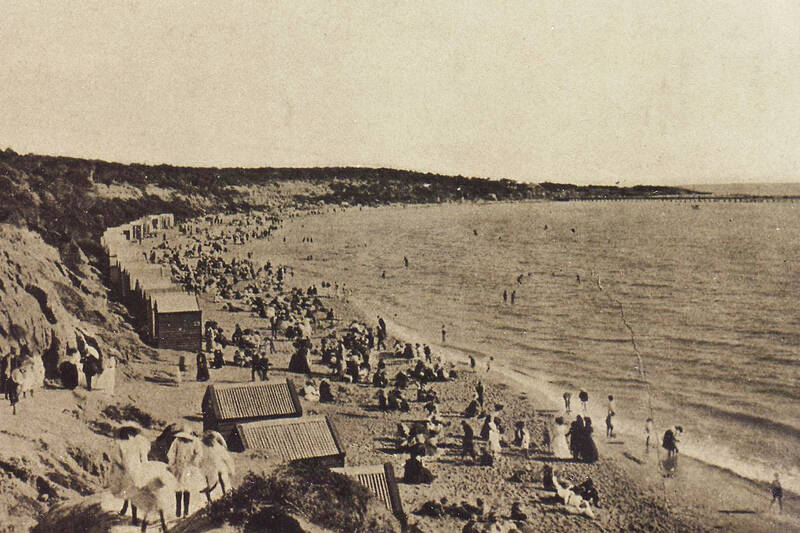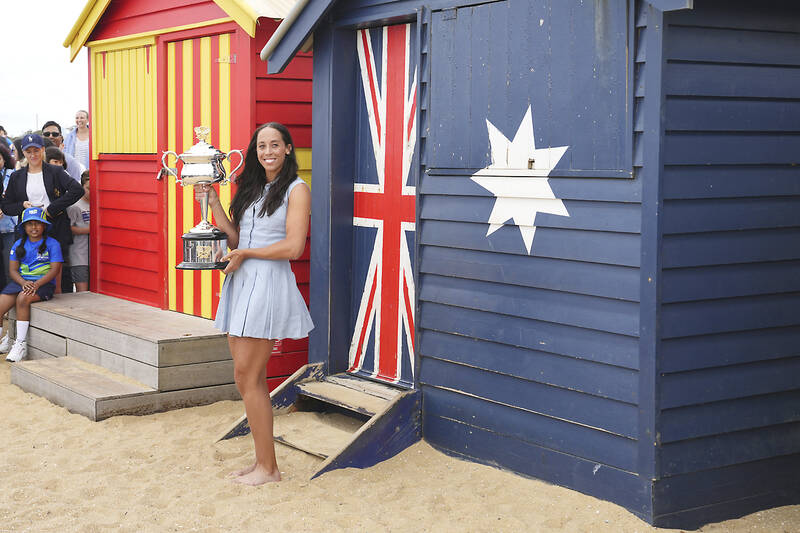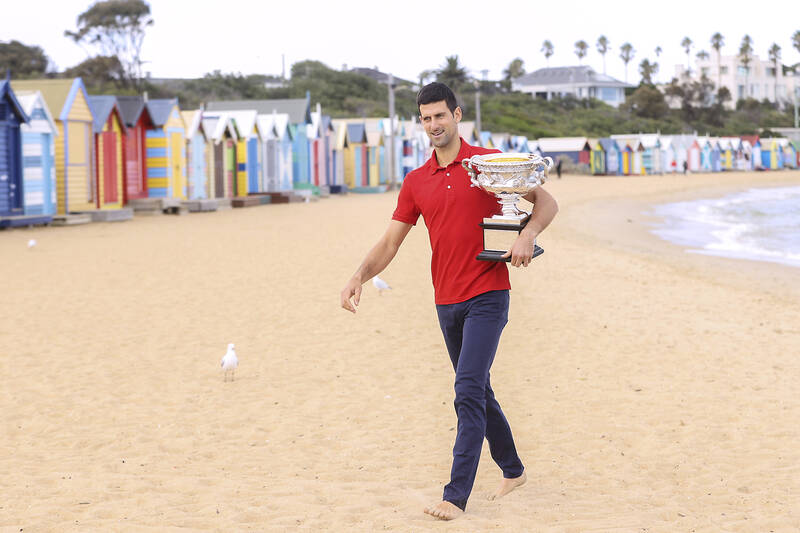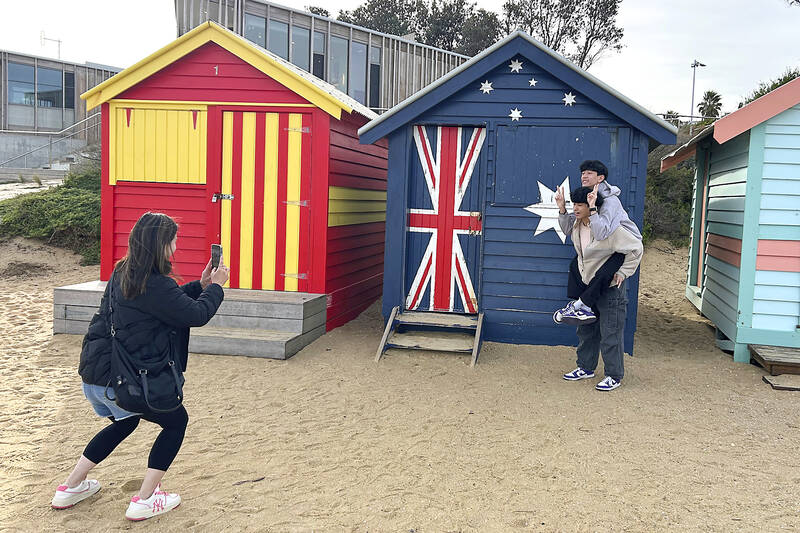The iconic, brightly painted coastal sheds in and around Melbourne, Australia, are a quirky real estate mix: absolute beachfront views, but lacking basic features including a bedroom, bathroom, running water and even power.
While they lack homely comforts, some can sell for more than an average Melbourne suburban house. And while the house comes with the security of land title, the shed is built on a public beach.
Known variously as beach boxes, bathing boxes and boatsheds, these basic structures have been features of the Victoria state coastline along Port Phillip Bay and Western Port since the 19th century.

Photo: Sandringham Historical Society via AP
What they have going for them these days as a financial investment is scarcity. Some real estate agents say boxes in the right location can be expected to double in value every seven to 10 years.
John Rundell doesn’t regard his bathing box on Dendy Street Beach in the upscale Melbourne suburb of Brighton as an investment.
“What’s the good of calling it an investment if you don’t want to sell it?” Rundell said.

Photo: AP
“I suppose the market price is the market price. It does encourage people that are not using them now to sell them. But they don’t turn over very often because they tend to stay within families through generations,” he added.
LOCATION, LOCATION, LOCATION
The prices and the rules surroundings beach boxes differ depending on where they are. A buyer needs to own a home in the area. And the sheds can’t be rented out or put to any commercial use. No overnight camping is allowed. Solar cells and motorized electricity generators are banned.

Photo: AP
Rundell had a young family when he bought Bathing Box No. 43 — one among 96 arranged side by side along the beach — for 12,000 Australian dollars (US$8,000) from the local council in 1992. The council and a local historical society defeated a state government plan in the 1970s to demolish them.
He continues to pay an annual license fee plus rates on the box, which he considers to be the council double-dipping on income from a single address. He also must pay for public liability insurance cover for the box to the value of AU$20 million (US$13 million).
The boxes are useful spaces to keep beach toys, kayaks, stand-up paddleboards, BBQs and beach furniture.

Photo: AP
Rundell’s family has shared Christmas lunches at their box and watched New Year’s fireworks displays during Southern Hemisphere summers.
There’s no electricity, but there is an ice chest to keep drinks cold. There is no plumbing, but there’s a camping potty with indoor privacy.
With Rundell’s children grown up and his granddaughter too young for the beach, the box is mostly used these days by friends who borrow the keys.
VICTORIA-ERA MORALITY
Victoria perhaps deserves to be Australia’s last bastion for these anachronistic structures. The state was named after Queen Victoria, the British monarch who reigned for most of 19th century. The rigid moral code of Queen Victoria’s era contributed to the creation of bathing boxes in Melbourne in the 1860s.
The boxes were to preserve a bather’s modesty when the law prohibited changing clothes on a beach and walking the streets in a swimsuit, local historian Jo Jenkinson wrote in her 2015 book, The Lure of the Beach: A History of Public Sea Bathing in Brighton.
Similar beach structures with similar origins still survive in other parts of the world.
There are no private beaches in Australia, so beach shacks were built on public land. Views have long been mixed on whether such private property has any place on public beaches.
All the sheds have been removed from Australia’s coastline over the decades except for around 2,000 in Melbourne’s vicinity.
The most expensive can be found in the wealthy tourist town of Portsea, a 90-minute drive from Melbourne. Portsea boxes often sell for AU$1 million (US$660,000). A record AU$1.2 million (US$800,000) was set last year.
The mean price of a Melbourne dwelling was AU$803,194 (US$530,378) in August, according to property research firm Cotality.
A record for a box sold outside Portsea was set at Mount Martha, an hour’s drive from Melbourne, in April, after a two-hour auction. Beach Box No. 26 on South Beach sold for AU$1 million (US$660,000), which was AU$350,000 (US$230,000) more than the expected price advertised by the vendor’s real estate agent, Alex Corradi.
Corradi said there were other boxes, which he calls boatsheds, at Mount Martha with covered decks that would sell for more. Owners can’t add covered decks because a shed’s design and dimensions can’t be altered.
“I don’t really see them going backwards. I think they will just continue to go up” in price, Corradi said, adding that the banks don’t share that confidence in their value as an investment. “The banks will not lend against it, so these are all cash buyers.”
Melbourne property investment adviser Cate Bakos accepts that scarcity will deliver beach box investors a capital gain in the long term. But she is concerned by their investment potential in the shorter term, with no financial return on an ongoing outlay.
“Buying a beach box is, quite frankly, an illogical purchase,” Bakos said.

Jacques Poissant’s suffering stopped the day he asked his daughter if it would be “cowardly to ask to be helped to die.” The retired Canadian insurance adviser was 93, and “was wasting away” after a long battle with prostate cancer. “He no longer had any zest for life,” Josee Poissant said. Last year her mother made the same choice at 96 when she realized she would not be getting out of hospital. She died surrounded by her children and their partners listening to the music she loved. “She was at peace. She sang until she went to sleep.” Josee Poissant remembers it as a beautiful

For many centuries from the medieval to the early modern era, the island port of Hirado on the northwestern tip of Kyushu in Japan was the epicenter of piracy in East Asia. From bases in Hirado the notorious wokou (倭寇) terrorized Korea and China. They raided coastal towns, carrying off people into slavery and looting everything from grain to porcelain to bells in Buddhist temples. Kyushu itself operated a thriving trade with China in sulfur, a necessary ingredient of the gunpowder that powered militaries from Europe to Japan. Over time Hirado developed into a full service stop for pirates. Booty could

Before the last section of the round-the-island railway was electrified, one old blue train still chugged back and forth between Pingtung County’s Fangliao (枋寮) and Taitung (台東) stations once a day. It was so slow, was so hot (it had no air conditioning) and covered such a short distance, that the low fare still failed to attract many riders. This relic of the past was finally retired when the South Link Line was fully electrified on Dec. 23, 2020. A wave of nostalgia surrounded the termination of the Ordinary Train service, as these train carriages had been in use for decades

Lori Sepich smoked for years and sometimes skipped taking her blood pressure medicine. But she never thought she’d have a heart attack. The possibility “just wasn’t registering with me,” said the 64-year-old from Memphis, Tennessee, who suffered two of them 13 years apart. She’s far from alone. More than 60 million women in the US live with cardiovascular disease, which includes heart disease as well as stroke, heart failure and atrial fibrillation. And despite the myth that heart attacks mostly strike men, women are vulnerable too. Overall in the US, 1 in 5 women dies of cardiovascular disease each year, 37,000 of them